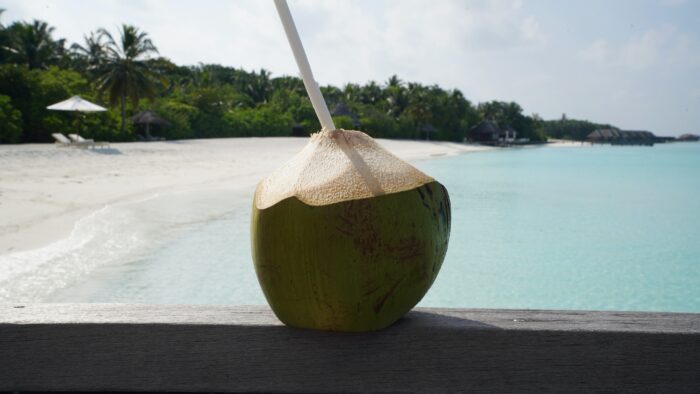Narikelodaka is the udaka or water of the green coconut, known in south India as tender coconut water
In a world full of carbonated drinks, be a sweet narikelodaka. Narikelodaka is the udaka or water of the green coconut, known in south India as tender coconut water. The fruit of the coconut tree (Cocus nucifera), known as narikela is used widely in the southern states of India. It is known as narikela in Sanskrit, kera in Malayalam, narkol in Bengali, nariyal in Hindi. Almost every Indian culture has a name for this fruit, which is often misunderstood as a nut due to its hard shell.
 The coconut grows well in coastal tropical regions, as it requires a lot of water to grown. The coconut grows in approximately 80 countries and is known as the tree of life, with a long history of important uses worldwide. The coconut fruit itself is one of the most versatile; every part of the coconut tree is used since ancient times, and the tree is mentioned in the ancient Vishnu Dharmashastra, a text on the sacred laws of India from c.600 BCE, and in the Vishnu Purana, an 80-chapter text of c.400 BCE, in which a conversation occures between sage Maitreya and his guru Parashara, on the nature of this universe. Narikela is known as the Kalpa-Vriksha according to Ayurveda, a divine, wish-granting tree, and is commonly used for blessings and rituals for new beginnings; it implies that the tree provides all that is needed for a good life.
The coconut grows well in coastal tropical regions, as it requires a lot of water to grown. The coconut grows in approximately 80 countries and is known as the tree of life, with a long history of important uses worldwide. The coconut fruit itself is one of the most versatile; every part of the coconut tree is used since ancient times, and the tree is mentioned in the ancient Vishnu Dharmashastra, a text on the sacred laws of India from c.600 BCE, and in the Vishnu Purana, an 80-chapter text of c.400 BCE, in which a conversation occures between sage Maitreya and his guru Parashara, on the nature of this universe. Narikela is known as the Kalpa-Vriksha according to Ayurveda, a divine, wish-granting tree, and is commonly used for blessings and rituals for new beginnings; it implies that the tree provides all that is needed for a good life.
Narikelodaka is a commonly craved drink in summer. It is not only nutritious, wholesome and natural, but is considered one of the world's superfoods.
All parts of the coconut are used. The hull is often used as a bowl. The broken curved piece is used as a scoop or spoon. The fruit in ripe form, known as the coconut meat, is one of the most commonly used ingredients in many Asian cuisines, either in chunks, flakes, ground coarse pieces or powder. Several parts of the tree have medicinal value including the coconut transparent water, the coconut milk which is extracted from the flesh or meat of the fruit, and the dry coconut from which oil is pressed and extracted. Narikela is one of the only fruits whose milk is used in food preparation all over the world.
Ayurveda understood the coconut milk and water to have intense cooling properties. It was used to counter burning sensation in the gut including acid reflux, or food poisoning, or too much heat in the body. It strengthens the body and also improves metabolism.
 Coconut oil has been widely used in south Indian cuisines for thousands of years as a food ingredient, but also for external application on the skin and hair before bathing, and as a medicinal food because it acts a natural coolant, calming down the rough/dry aspect of vata and the heat of pitta, but supporting Kapha as it is an oil. Coconut oil is widely recommended for frying as it is a stable oil and nourishes the depleted tissues in the body.
Coconut oil has been widely used in south Indian cuisines for thousands of years as a food ingredient, but also for external application on the skin and hair before bathing, and as a medicinal food because it acts a natural coolant, calming down the rough/dry aspect of vata and the heat of pitta, but supporting Kapha as it is an oil. Coconut oil is widely recommended for frying as it is a stable oil and nourishes the depleted tissues in the body.
Ayurveda classifies the use of coconut according to the maturity of the fruit: tender green coconut, half-mature coconut, and fully matured coconut. Tender coconut water - narikelodaka - is recommended for its sheeta (cooling) effects in the body. It is a natural coolant that helps clean the urinary bladder and also promotes better digestion due to its ability to calm down the Pitta. It is one of the most important foods for summer and is best as a daily drink, both to counter dehydration and to bring down excess pitta and maintain good health. Tender coconut water also has a replenishing effect and is the ultimate natural refreshing drink because it is full of various electrolytes that are essential replacement during loss in sweat during summers.
The fully matured coconut is useful as grated fruit for hyper-acidity. The stone or wood-pressed oil extracted from the dried fruit is used in a variety of medicinal formulations, especially the oils used in pancakarma treatments. Alkali made from the coconut is known for its stomach-relieving properties.
Coconut is mentioned in the Oushadi Varga (medicinal formulations) chapter of the Kaiyadeva Nighantu, an herbal compendium of the 14th century CE.
तस्योदकं हिमं स्निग्धं मधुरं बस्ति शोधनं |
दीपनं शुक्रलं ह्रदयं लघु तृट दाह पित्तनुत ||
Source: Kaiyadeva nighantu, Oushadi Varga ,Varga1, Narikela, Shloka 270
Transliteration - tasyodakam himam snigdham madhuram basti shodhanam |
deepanam śukram hṛdayam laghu tṛt daha pittanut ||
Translation - [narikelodaka is] cooling inside the body, moist, sweetish in taste and cleanses the bladder through diuresis. It acts to kindle the digestive fire (deepana), is aphrodisiac in action, is pleasant to the mind and heart, is light to digest, relieves thirst, burning heat in the body, and pacifies the pitta dosha.
Narikelodaka can be enjoyed at any part of the hot day. If the weather is cool or the moon is creating dew and cooling effects, it is advised to avoid coconut water during the late night, and to drink it only when the sun is out due to its hima (cooling) effects and ability to provoke kapha, resulting in congestion and phlegm in the throat.
Its rich supply of electrolytes provide instant energy. After physical exercise, coconut water is an ideal rehydrating and refreshing drink. Natural coconut water is one of the best alternatives for oral rehydration after illness. Its benefits over synthetic drinks is unparalleled.
Realistic Aspects of Narikelodaka
 While the great benefits of narikelodaka have now been embraced by the west and modernized cultures, they have unfortunately neglected the advice of the ancient wisemen. Tender coconut water is potently medicinal to pacifies the pitta dosha and thirst (trsna) when freshly collected from the freshly harvested fruit. It is excellent for acute gastroenteritis, which is common on hot summer days when food can rot easily. Narikelodaka is a good coolant (hima), snigdha, hrudya (cardio-protective), nourishing and soothening. It relieves ama dosha and helps in better digestion, as the agni is less during summer season. It also helps in cleansing of urinary bladder by eliminating the toxins (doshas). It is considered a natural aphrodisiac (vrushya).
While the great benefits of narikelodaka have now been embraced by the west and modernized cultures, they have unfortunately neglected the advice of the ancient wisemen. Tender coconut water is potently medicinal to pacifies the pitta dosha and thirst (trsna) when freshly collected from the freshly harvested fruit. It is excellent for acute gastroenteritis, which is common on hot summer days when food can rot easily. Narikelodaka is a good coolant (hima), snigdha, hrudya (cardio-protective), nourishing and soothening. It relieves ama dosha and helps in better digestion, as the agni is less during summer season. It also helps in cleansing of urinary bladder by eliminating the toxins (doshas). It is considered a natural aphrodisiac (vrushya).
But if it is not freshly collected, or is ripened coconut water, or harvested and kept for long hours, it turns brown when exposed to air. The ancient wisemen reminded us that old coconut water causes vistambha (constipation) and increases pitta dosha. Tender coconut water is easy to collect from the tree in its original container but very sensitive to chemical and biological changes if exposed to outside air or stored for a long time.
Due to its amazing and unique immune-boosting and gut-healing properties, coconut water has drawn attention of manufacturers as natural functional drink. Without understanding the medicinal chemistry of the fruit's water, they have collected, processed, irradiated, packaged and exported it to many countries, for the sake of profit. The thermal treatment and chemical additives essentially destroy the medicinal benefits of narikelodaka for which it was touted as a great drink. Without connection to the original knowledge of the wisemen, coconut water today is available in different forms such as chilled or frozen coconut water, pasteurized, carbonated and microfiltered. Due to ignorance and greed, not only has commercial coconut water lost its medicinal benefits, but it now creates the exact problem for which coconut water was revered and earlier prescribed.





